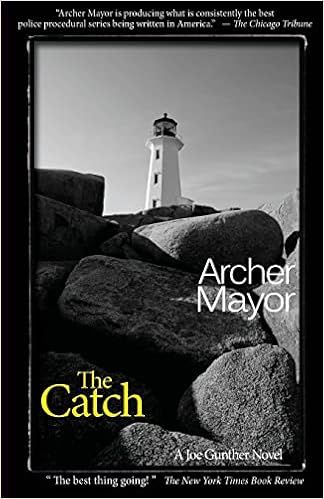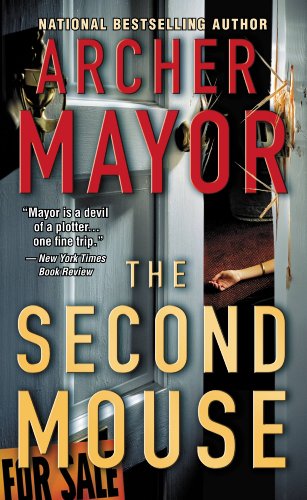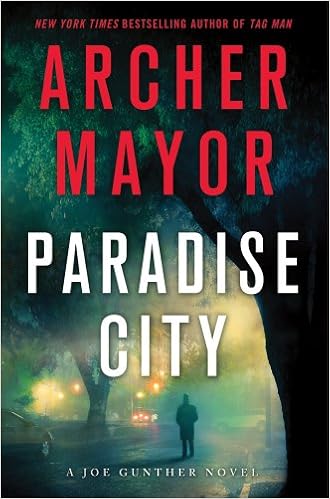
Description
"Mayor's New England eye mercilessly details what he seeswithout the "calendar nostaligia" that usually clings to such villages andbackwaters. We get sucked into a web of drug smugglers from dead kingpins toirascible sidekicks. The clever plot expands like a dark whirlppol and revealsthe underbely of Vermont and Maine." - Providence Journal"Archer Mayor doesn't do quaint. He might use poetic imageryto describe the austere beauty of New England's rugged mountains and snowboundvillages, but as far as their crime content is concerned, his policeprocedurals are about as authentic as it gets." -- New York Times"Mayor's fine 19th Joe Gunther novel (after 2007's Chat)will leave fans feeling fully satisfied." - Publisher's Weekly “I once asked my wife who her favorite mystery author was and she said Archer Mayor… I’m not sure our marriage has recovered.” ―Craig Johnson, Author, Walt Longmire Mysteries, the basis for A&E’s hit drama “Longmire” Archer Mayor is the author of the highly acclaimed Vermont-based series featuring detective Joe Gunther, which the Chicago Tribune describes as “the best police procedurals being written in America.” He is a past winner of the New England Independent Booksellers Association Award for Best Fiction―the first time a writer of crime literature has been so honored. In 2011, Mayor’s 22nd Joe Gunther novel, TAG MAN, earned a place on The New York Times bestseller list for hardback fiction. Before turning his hand to fiction, Mayor wrote history books, the most notable of which, Southern Timberman: The Legacy of William Buchanan, concerned the lumber and oil business in Louisiana from the 1870s to the 1970s. This book was published in 1988 and very well received; it was republished as a trade paperback in 2009. Archer Mayor is a death investigator for Vermont’s Office of the Chief Medical Examiner, a detective for the Windham County Sheriff’s Office, the publisher of his own backlist, a travel writer for AAA, and he travels the Northeast giving speeches and conducting workshops. He has 25 years of experience as a volunteer firefighter/EMT. Mayor was brought up in the US, Canada and France and had been employed as a scholarly editor, a researcher for TIME-LIFE Books, a political advance-man, a theater photographer, a newspaper writer/editor, a lab technician for Paris-Match Magazine in Paris, France, and a medical illustrator. In addition to writing novels and occasional articles, Mayor gives talks and workshops all around the country, including the Bread Loaf Young Writers conference in Middlebury, Vermont, and the Colby College seminar on forensic sciences in Waterville, Maine. Mayor’s critically-acclaimed series of police novels feature Lt. Joe Gunther of the Brattleboro, Vermont, police department. The books, which have been appearing about once a year since 1988, have been published in five languages (if you count British), and routinely gather high praise from such sources as The New York Times, Washington Post, Los Angeles Times, New Yorker, and others, often appearing on their “ten best” yearly lists. Whereas many writers base their books only on interviews and scholarly research, Mayor’s novels are based on actual experience in the field. The result adds a depth, detail and veracity to his characters and their tribulations that has led The New York Times to call him “the boss man on procedures”. Excerpt. © Reprinted by permission. All rights reserved. Deputy Sheriff Brian Sleuter was looking for a better country/western station when the Toyota flew by, spraying a few roadside pebbles against the front bumper of his cruiser. “Jesus Christ, Bud,” he said softly, turning on his headlights, putting the car into gear, and hitting his blue lights ― all in a single, well practiced gesture ― “Why don’t you flip me the bird, while you’re at it?” He fishtailed into the road from his hiding place, his rear tires spinning before gaining purchase, and took off down Vermont Route 7 with a burst from the Impala’s built-up engine, the Toyota’s rear lights already fading fast into the late night summer darkness. This stretch of road ― straight, isolated, and well-paved ― was a magnet for speeders. It was long after midnight, and Sleuter had been waiting patiently for just such an opportunity. In the split second that his well trained eye had glimpsed the interior of the car, illuminated only by its own dash lights, he’d caught sight of two people, both young males. That, combined with the Toyota being older, dark-colored, and non-descript in appearance ― and that it was headed south from the direction of Burlington and possibly Canada ― helped him think he might be about to tag his first drug runner in five weeks. That had been way too long for a certifiable, self-admitted, Type-A personality like Brian Sleuter. He saw himself as a man on the make, and the faster that he created a name for himself ― even in this Podunk, left wing, tree-hugger state ― the sooner he could move up to some outfit like ATF or DEA where he could really throw the book at the bad guys. The Toyota grew in size before him as he pushed the accelerator to the floor. Official police denials notwithstanding, high speed rundowns had their thrills. The engine’s unleashed roar, the sudden blurring of scenery on both sides, pulsing to the strobe bar’s steady beat, heightened the defiant, indomitable sense of superiority that washed through Sleuter every time he put on his uniform. He’d been told that wasn’t a good thing ― that it ran counter to the whole professional, courteous, protect-and-serve bullshit the boss spouted at monthly trainings ― but he knew what he knew, which was that a gun and a badge made for a good argument in a fight, and that he had no interest in being a social worker. Call him a jackass if you had front teeth to spare, but at least he was no loser. The Toyota began slowing down, pulling over to the side of the narrow road. Ahead of them both, a pair of headlights crested a distant hill, aiming their way. Sleuter instinctively charted their progress, as he was simultaneously watching for any suspicious activity from the Toyota, but all the on-comer did was slow as they always did upon sight of the blue lights, before sliding by timidly as Sleuter angled his cruiser to a stop behind his quarry. He hit the spotlight switch by his left window, freezing the car before him in a blinding halo, and removed the radio mike from its cradle. “Fifty-one ― Dispatch.” “Fifty-one. This is Dispatch.” “I’m Seventy-five Massachusetts passenger Romeo Foxtrot Zulu, Three Eight One, a mile or two north of the Route 17 crossroad on Route Seven.” “Ten-Four, Fifty-one.” At least Dispatch was on the ball, Sleuter thought as he opened his door, not shooting the shit with someone or taking a leak, as usual. He glanced at the camera screen glowing high and near the center of his windshield, to make sure the icon representing his body recorder was on. He wasn’t a huge believer in high-tech gadgets ― he hated computers, for example ― but he’d won more than one case in court because of voice and image recordings. He emerged from his car and paused, studying what he could see of the two men caught in the harsh glare. Unfortunately, that only amounted to the backs of their heads. He needed to know what their hands were doing. He circled around to the rear of the cruiser, keeping out of his own lights, and closed in on the Toyota from its right side, thereby avoiding being seen in the driver’s outside left mirror ― the place most operators checked to monitor an officer’s approach. When he came even with the car’s right, rear bumper, knowing he’d entered the cruiser’s camera frame, Sleuter did one more thing out of long habit: he reached out with his left hand and pressed it against the metal of the vehicle. This strict official protocol, a gesture born of painful past experience, reflected how many times cops had been shot and/or killed during a stop, and their evidentiary fingerprints later found on the suspect’s car. Each time Sleuter touched a vehicle this way, he did so consciously, as aware of the bet he was hedging as when he donned his ballistic vest before every shift. He stopped again to scrutinize what he could see of the interior of the car, and to add to the discomfort of its occupants. He also glanced around quickly. There weren’t any trees along this stretch ― it was open, rolling countryside, cupped between the Green Mountains to the east, and the Adirondacks across Lake Champlain to the west. At night, that made it overwhelmingly black and vast, and helped make Brian Sleuter feel like the most exposed object for miles around. Returning to the task at hand, and secure that he’d seen no obvious signs of danger from inside the passenger area, like the glint of a gun or a suspicious posture or movement, he turned on his small, powerful handlight and shined it directly into the car, starting with its rear seat. Again, he saw nothing untoward. Both heads swiveled in his direction as he walked up to the passenger window and tapped on it with his light, standing even with the back door to make of himself a harder target. The window whirred down. “Hey, there, officer,” the driver spoke across the chest of his companion, who merely stared ahead after the briefest glimpse in Sleuter’s direction ― an immobility Brian found telling. “Evening,” he answered. “I’d like to see your driver’s license, registration, and proof of insurance.” The driver, a young man with a mustache and a silver post twinkling in the nest of his left eyebrow, smiled and nodded. “Sure thing, officer.” He reached over and opened the glove box before the Sphinx-like passenger. Sleuter followed the man’s hand with his flashlight beam and watched it fish among an assortment of documents and food wrappers, eventually finding a wrinkled envelope and pulling it out. The driver extracted the requested paperwork and handed it over. Sleuter glanced at the Massachusetts license he held in his left hand, having wedged his light under his left armpit ― thereby keeping his gun hand free at all times. “This your current address, Mr. Marano?” “Nah. I moved. The right one’s on the registration. I’m still getting the license changed.” Sleuter nudged the passenger on the shoulder. “How ‘bout you? You got any identification?” The passenger finally looked up at him fully, his expression tense. “I didn’t do nuthin’.” “Didn’t say you did. Got any identification?” The man hesitated. He was also young, like the driver, but sported a goatee and no piercings that Sleuter could see. He did, however, have the edge of a tattoo poking just over the top of his t-shirt. It looked like part of a snake. He was also sweating, which Sleuter found noteworthy. It was summer, fair enough, but that didn’t have the same meaning up here as it did farther south ― the nights generally ran cool, just like now. “Sure. No problem,” the man said, and reached for his back pocket, lifting himself off the seat in the process. Sleuter stepped back, watching them carefully. Every nerve in his body told him he had something cooking here, people with criminal records at least, and probably more. He took the other man’s driver’s license when it was handed to him, and repeated his earlier question: “You still at this address, Mister ―” he paused to read, “Grega?” “Sure,” Grega answered, once more looking straight ahead. Sleuter paused a moment, considering his approach. What he was hoping for was a consent search. What he knew he should request was backup. But he was reluctant to pursue that. If this panned out the way he was hoping, he didn’t want to share the credit. “What happens when I run you two through the computer?” he asked. “I gonna find anything?” “Not me, officer,” Marano said with his quick smile. “You can check all you want.” “Yeah,” Grega answered more ambivalently. “Check all you want.” Sleuter nodded, mostly to himself. Those were pretty standard responses. And didn’t mean much. People either thought that out-of-state records didn’t cross the border, or that Vermont cops were too dumb to even operate a computer. Or both. “Okay,” he told them. “Stay put. I’ll be right back.” “Take your time, officer,” said Marano, his courtesy tinged with contempt. Sleuter backed away, keeping his eye on the car as he went, not fully turning away until he felt he was safe. As before, he circled the rear of his cruiser to regain his seat, still not wanting to give his suspects the slightest flash of his silhouette. “Fifty-one ― Dispatch,” he radioed after closing his door behind him. “Dispatch.” “You have a Twenty-eight? Twenty-seven, RO.” Dispatch gave him the registration first, as requested. “Massachusetts passenger Romeo Foxtrot Zulu, Three Eight One, is a 2004, two-door Toyota Solara, color black, registered to James Marano and valid until 2009.” She gave him the address in Boston, on Dorchester Avenue ― nicknamed “Dot Ave” among cops, and infamous as a drug and gang hotbed. It matched what appeared on Marano’s registration. “The twenty-seven,” she continued in the same flat voice, referring to the registered owner’s ― or “RO’s” ― operator’s license, “Is valid in Massachusetts. No priors in Vermont.” That was the first layer, and usually the most useless. Sleuter opened his mouth to ask her to dig deeper, when he simultaneously noticed two things that made him abruptly straighten in his seat ― the passenger in the Toyota was no longer visible, and there was a sudden movement to his left. But that was all. The bullet entering his temple put an end to everything else. Read more
Features & Highlights
- Joe Gunther gets the call that every law enforcement person hates and every friend and family member of a policeman fears–-a cop has been murdered in the line of duty. Deputy Sheriff Brian Sleuter has been shot to death during a routine traffic stop on a dark country road. From what can been seen on the cruiser’s tape recorder of the killers, it is believed that they are a couple of Boston-based drug runners who were stopped by the deputy on their way from Canada down to Boston.
- That brings Gunther and his major crimes team into the investigation―-and eventually to Alan Budney, the disaffected son of a Maine lobsterman, now a drug kingpin, who uses the closed, clannish lobster fishing community, and his extended family in particular, to move drugs along the New England coast.




